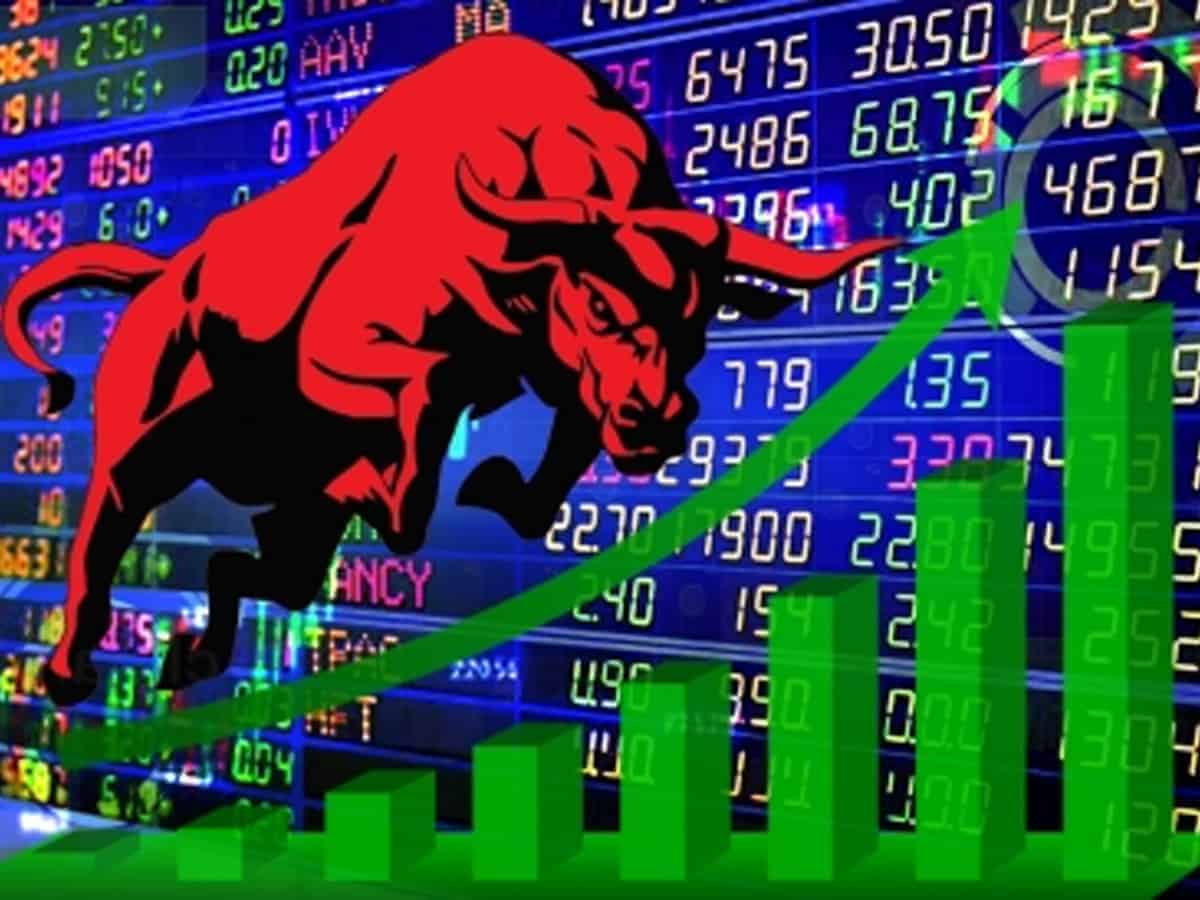
Mumbai: Equity benchmark indices Sensex and Nifty ended lower in highly volatile trade on Thursday due to selling in banking, metal and energy counters amid a mixed trend in the global markets.
Falling for the second day in a row, the 30-share BSE Sensex declined 193.70 points or 0.31 per cent to settle at 62,428.54 even after a positive beginning. During the day, it fell 263.1 points or 0.42 per cent to 62,359.14.
The NSE Nifty fell 46.65 points or 0.25 per cent to finish at 18,487.75.
“Despite challenges in the global economies, the domestic market displayed better than estimated Q4 earnings growth, along with 7.2 per cent GDP growth in FY23, adding buoyancy to the market during the week.
“However, today the market closed with a marginal negative bias in which banks witnessed heavy profit-booking. Investors turned cautious in anticipation of inflationary pressure in the US after raising the US debt ceiling,” said Vinod Nair, Head of Research at Geojit Financial Services.
From the Sensex pack, Bharti Airtel fell 3.42 and Kotak Mahindra Bank declined 3.31 per cent. ICICI Bank, ITC, HDFC Bank, UltraTech Cement, HCL Technologies and Maruti were the other major laggards.
Tata Motors, Hindustan Unilever, Asian Paints, Sun Pharma, Nestle, Tata Consultancy Services, Wipro, Bajaj Finance, Axis Bank and IndusInd Bank were among the gainers.
Meanwhile, S&P Global Ratings said Reliance Industries Ltd’s operating performance is likely to remain resilient over the next two years, as the firm’s growing presence in the digital and retail segments will temper softer earnings in the energy business.
Reliance shares fell 0.51 per cent to close at Rs 2,462.05 apiece on BSE.
Institutional investors lapped up Coal India’s share in the maiden government’s stake sale this fiscal, with Rs 6,500 crore bids pouring in on the first day of the offer for sale.
Investors sought 28.76 crore shares against the 18.48 crore total shares offered in the 2-day OFS, stock exchange data showed.
The government offered over 8.31 crore shares to institutional investors on Thursday under the OFS, but, received bids for 28.76 crore shares or 3.46 times.
“Within the Indian market, Coal India witnessed a 4 per cent decline as the government set the Offer for Sale (OFS) floor price at Rs 225 per share. This announcement might have influenced investor sentiment and contributed to the profit booking in the market,” said Prashanth Tapse, Senior VP (Research), Mehta Equities Ltd.
In the broader market, the BSE smallcap gauge climbed 0.61 per cent and the midcap index advanced 0.11 per cent.
Among the indices, bankex fell 0.82 per cent, metal declined 0.79 per cent, energy (0.65 per cent), financial services (0.41 per cent), telecommunication (0.27 per cent) and commodities (0.18 per cent).
Realty jumped 1.19 per cent, healthcare (0.84 per cent), consumer discretionary (0.64 per cent), utilities (0.68 per cent) and IT (0.52 per cent).
“Markets traded volatile and ended marginally lower on the weekly expiry day. After the flat start, the Nifty oscillated in a narrow range and finally settled around the day’s low at 18,487.75 levels.
“Meanwhile, a mixed trend was witnessed on the sectoral front wherein banking and financials traded under pressure while pharma and realty edged higher. The outperformance continued from the broader front as both ended in the green,” said Ajit Mishra, SVP – Technical Research, Religare Broking Ltd.
In Asian markets, Seoul and Hong Kong ended lower, while Tokyo and Shanghai settled in the green.
Equity markets in Europe were trading in positive territory. The US markets ended lower on Wednesday.
European markets were largely higher on Thursday while Asian markets were mixed after the United States House of Representatives approved a debt ceiling and budget cuts package, avoiding a default crisis and Federal Reserve officials hinted at a pause in interest-rate hikes, Deepak Jasani, Head of Retail Research, HDFC Securities, said.
“Markets were sluggish with a negative bias as concerns over the delay in the US debt ceiling bill and decline in China’s factory activity prompted investors to trim exposure in banking and metal stocks. The strong Q4 GDP numbers failed to improve sentiment as the focus shifts to changes in the global arena,” said Shrikant Chouhan, Head of Equity Research (Retail), Kotak Securities Ltd.
Firing on all cylinders, India continues to maintain its streak of world-beating economic growth after GDP for the March quarter beat all expectations with a 6.1 per cent expansion that helped push the annual growth rate to 7.2 per cent.
Manufacturing activities in India advanced further and touched a 31-month high in May supported by a stronger increase in new orders and favourable market conditions, which in turn generated more employment opportunities, a monthly survey said on Thursday.
The seasonally adjusted S&P Global India Manufacturing Purchasing Managers’ Index (PMI) rose from 57.2 in April to 58.7 in May, indicating the strongest improvement in the health of the sector since October 2020.
Global oil benchmark Brent crude dipped 0.17 per cent to USD 72.48 a barrel.
Foreign Institutional Investors (FIIs) continued to remain, net buyers, as they bought equities worth Rs 3,405.90 crore on Wednesday, according to exchange data.
In the US, veering away from a default crisis, the House approved a debt ceiling and budget cuts package late on Wednesday, as President Joe Biden and Speaker Kevin McCarthy assembled a bipartisan coalition of centrist Democrats and Republicans against fierce conservative blowback and progressive dissent.
